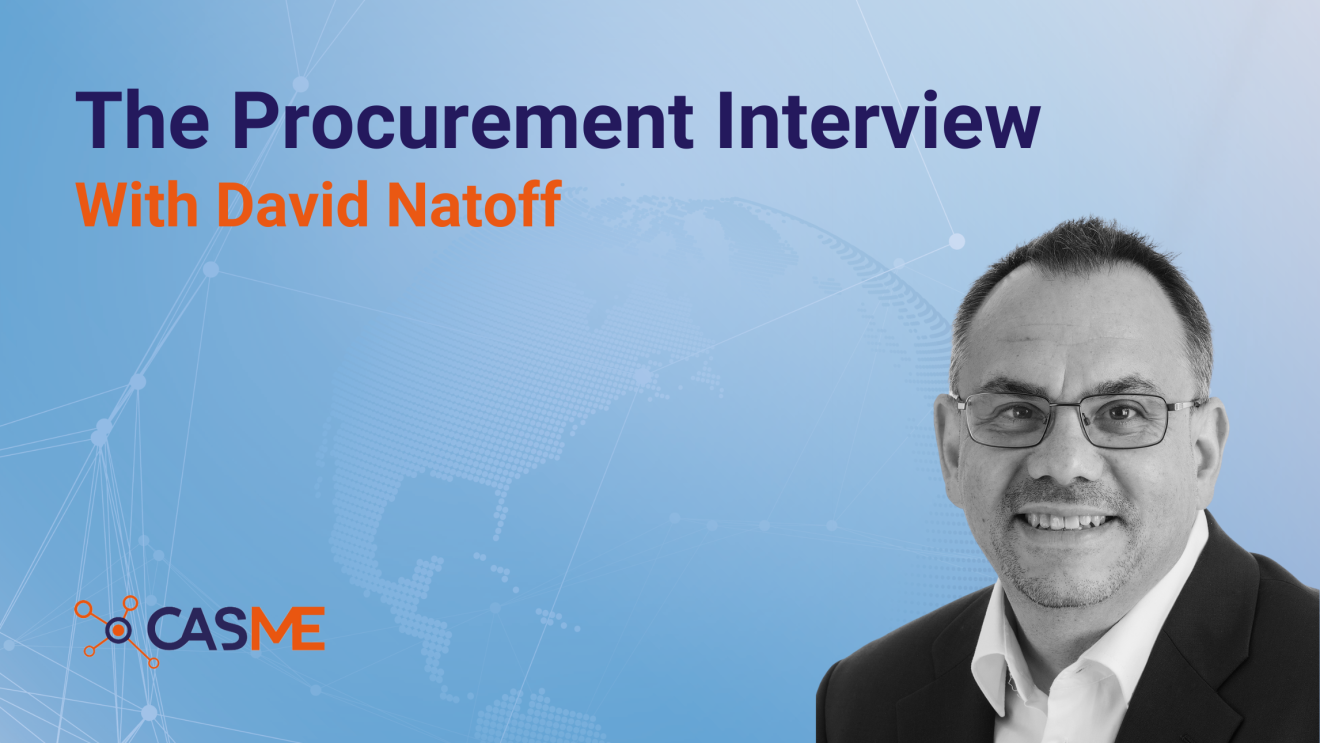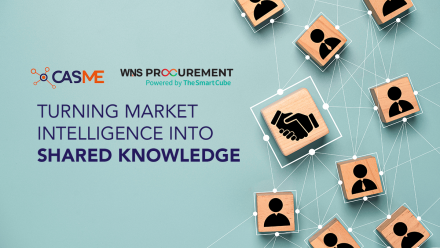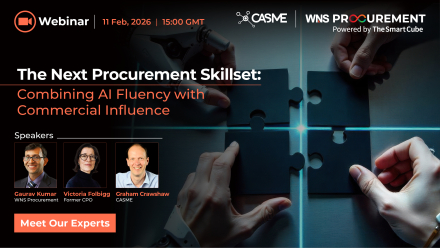
David Natoff established Google’s global Procure-to-Pay function and Strategic Sourcing team during a tenure that lasted over a decade. He is now a key part of the CASME facilitation team, bringing his vast experience to chair events for members on various procurement topics and multiple indirect categories. We caught up with him to find out how he got into Procurement.
How did you get into Procurement?
Like many people in Procurement, I fell into it by accident. After studying Business at school, I had been wondering what job to do. A friend suggested I apply to Tower Records and it turned out that I knew the store manager, who used to run my local record shop when I was at University! He offered me a job on the spot and said, “I'm going to teach you to be a buyer”. I had no idea at the time what this would entail, but I was thrilled. I ended up being the singles buyer at their flagship London store (when singles were a thing). I wanted to learn more and applied for a role with the UK Government, who were offering CIPS training. The rest is history!
What has been the biggest challenge of your career so far?
Without a doubt - my first year working for Google. I had been hired to run Procurement for Europe out of their Dublin office. I relocated from America, where I was working previously to take on the role. I arrived and things were a complete mess. There were few systems, tools or processes in place. Purchasing was entirely transactional in nature with a small amount of tactical activity and little strategic work.
Only a small amount of spending was conducted using purchase orders, and stakeholders were screaming at both Procurement and Accounts Payable because their suppliers were not getting paid. This was all under an environment of insane growth of close to 50%! Within just a few short weeks, I temporarily moved back to the US while my family remained in Ireland and started the process of bringing in incredible talent to form a Procure-to-Pay (P2P) team.
By the beginning of the following year, we had stabilised operations, had a robust process in place; and had partnered with an outsourcing partner to manage transactional activity which we could not yet automate. We were well into our implementation of a P2P system and had put in place a 'No PO, no pay' policy.
What has been the most significant success of your career so far?
My passion project was the successful formation of Google's strategic sourcing team. I was able to find some fantastic talent, and together we built a tremendous team that accomplished a lot in a short time. By the end of my second year, we were acknowledged by the Chief Financial Officer for building a world-class team. A year later, we received a founder's award for helping save over half a billion dollars through strategic sourcing initiatives.
To this day, the Strategic Sourcing team and the wider P2P team, which included Operations, Accounts Payable and Travel & Expenses, is the best team in which I've ever been a part. I’m unbelievably proud that I helped build and subsequently led it.
What advice would you give to someone starting a career in Procurement – especially young people?
I think one of the most exceptional pieces of advice I ever received was to focus on one or two things and become very good at them first; before diversifying into other areas.
I love ice cream (who doesn't?), and I remember a pep talk from one of my former managers during an annual review meeting where I was setting my objectives for the following year. I had a list of targets as long as my arm, and of course, on reflection, I was never going to achieve them all. My manager told me to focus first on perfecting the best vanilla ice cream I can as everyone loves vanilla. Once it's the best, you can then start thinking about chocolate, strawberry, and my personal favourite - coconut.
The reality is that if you try to do too many things at once, at best, you will be mediocre at them all. Even worse, you could fail at some of them. Prioritise carefully so you can be successful. I think this is especially valid when starting a new career, and with Procurement being such a vast area with so many disciplines and areas to specialise in, one could easily get lost while trying to boil the ocean. I'm not necessarily advocating specialisation. What I am supporting is: master your objectives and then seek out new ones, as this will foster continuous learning.
How do you think we could get more young people interested in Procurement?
This is such an interesting question, as I think things are very different today from where we were thirty years ago when I was starting my career. I only know one person who knew from a very early age that he wanted to be a procurement executive, and that is my good friend Dr Bernd Huber. He is a leader at Google's Procurement Center of Excellence, who at the age of fourteen, had some Chief Sourcing Officer business cards printed.
On a more serious note, Bernd did his PhD in Supply Chain Management. That's the great thing, now you can do PhDs, MBAs or even Degrees in Supply Chain Management which were just not available when I was starting.
I think even greater investment in education is crucial, and I've been impressed with organisations such as ISM and their support of the R. Gene and Nancy D. Richter Foundation providing scholarships to young aspiring procurement students. I've been honoured to participate in this programme, acting as a mentor to several young students who have since entered the procurement profession, and have found it to be incredibly rewarding.
I think there is more we can do as senior professionals to help mentor and coach young people entering our profession and I'm very grateful to all those who have mentored and advocated for me during my career.
Finally, what inspires and motivates you?
For me, it's people. It's always been people because I'm a relationship-kind of person, and it's how I get my energy. Still, I realise that different people are motivated and inspired by different things, and that's why diversity is so important. Having people around you from different backgrounds with different ideas and perspectives is critical.
It can be hard to manage, but without that diversity, I think it’s difficult for innovation and creativity to grow. I think it's also essential to have a healthy work-life mix, realising that people have different balances. In the past, I have not always got that balance right, and I can speak from personal experience that it can have some pretty significant consequences, in my case, impacting my health.
I think that balance is much better today. I get to spend time with CASME interacting with amazing procurement professionals across the globe, covering multiple different areas and from whom I’m always learning. I also get to spend time with friends and family, especially my wife, who astounds me with her creativity daily (she's a ceramicist). So of course, it's people and will always be so.
Back to News



